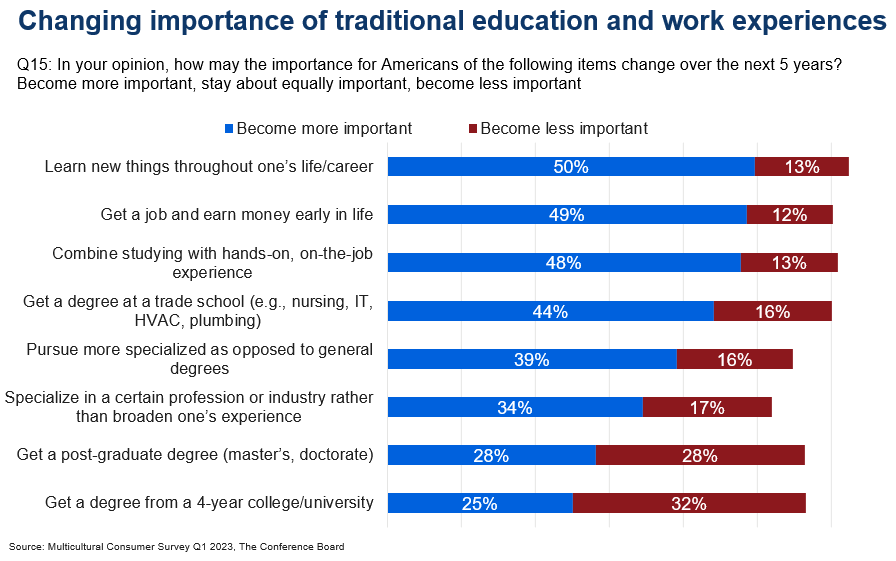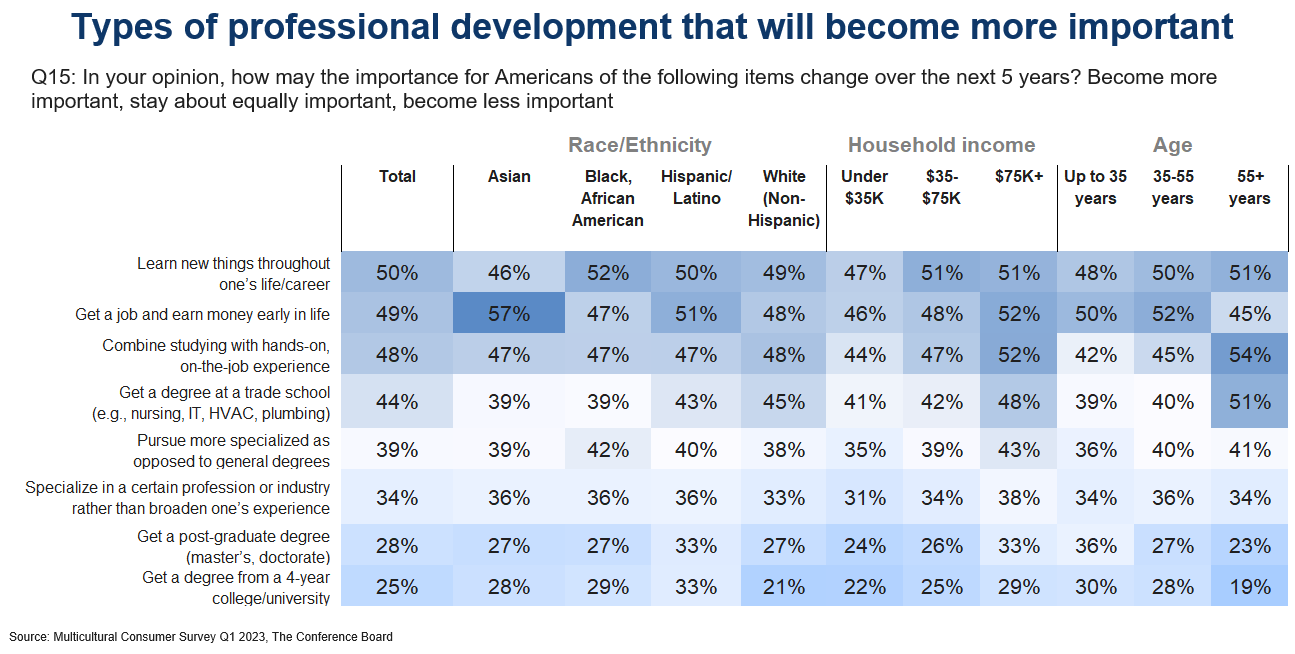Balancing Employees' Flexible Work Expectations with Productivity Goals
July 31, 2023 | Publication - The Conference Board
Denise Dahlhoff, PhD
As companies pursue their business and productivity goals, they are actively exploring strategies to keep employees satisfied in a competitive labor market. These strategies include implementing hybrid and remote work options, and even experimenting with pilots of a four-day workweek. However, in addition to prioritizing employee happiness, companies need to identify work models that effectively foster innovation, creativity, efficiency, and value creation. It is essential to strike a balance between promoting employee satisfaction/ engagement and achieving broader organizational objectives. Our latest Multicultural Consumer Survey of 2,000 US people, including workers in a range of professions, highlights some emerging trends.
Trusted Insights for What’s Ahead
- Most respondents believe that fully remote work is best for their own productivity but that a hybrid model best supports their company’s productivity. To address any concerns about reduced flexibility, organizations can emphasize the advantages of working on-site, such as increased networking opportunities, relationship building, collaboration, and personal growth.
- Employees under age 35 were most likely (43 percent) among all age groups to say they would quit if called back to fully in-person work, highlighting the importance of multigenerational work policies, including flexible scheduling and remote work, especially for companies seeking to attract and retain younger talent.
- A four-day workweek, currently being piloted by a small number of companies globally, would require significant work reorganization and coordination to offer continuous service for customers and manage emerging crises. Employees would need to show considerable flexibility. Right now, less than a quarter of respondents say they would accept lower compensation for less time worked, and only 30 percent say they would be willing to give up some work location flexibility in exchange for a four-day workweek. Younger employees, especially those under 35, are most open to sacrificing some compensation for a shorter workweek.
- Almost half of respondents (44 percent) say qualifying in a trade will become more important over the next five years, compared to 25 percent who see a four-year college/university degree rising in importance for job seekers. In a tight labor market and amid demographic challenges, accepting alternative credentials opens the door for organizations to consider a wider, more diverse range of candidates and for employees to consider roles that were previously unavailable to them.
Finding a Balance: Personal vs. Company Productivity
Overall, 41% of respondents feel most productive when working fully remotely, but 35・5-year-olds, higher-income earners, and Asian Americans feel most productive with a hybrid model

- Managers can remind their teams of the positive aspects of working on-site to ease employees’ resistance to reduced flexibility. Purposeful in-office activities can help convince employees who feel more productive at home. For example, team leaders could schedule ideation workshops, planning sessions, and in-person workdays for projects that require a lot of coordination. On-site time can also be used for culture building and to collaborate with other teams.
- Positive aspects to highlight include more connection with colleagues, less blurring of work-life boundaries, and more opportunities to network, build relationships, collaborate, and grow professionally, according to a 2022 survey from The Conference Board on workers’ concerns about working remotely and the benefits employees see in a physical workplace. Relatedly, The Conference Board 2023 Job Satisfaction report finds hybrid workers are happier than fully remote workers with certain job dimensions, including leadership quality, organizational culture, wages and benefits, training, and growth potential.
In general, employees say that fully remote work is best for their own productivity but that hybrid work best supports their company’s productivity

Employees of all ages, races, and income brackets consider hybrid work more productive for their company than fully remote work; Black and lower-income workers are most likely to suggest the opposite

Employees younger than 35 and older than 55 are most likely to view fully remote work as less productive for their company than for themselves, which makes a business case for working on-site at least some of the time

Hybrid Work Models Are Important to Attract Age-Diverse Talent
Flexibility divide: the option to work remotely skews toward higher-income employees who likely work in offices; lower-income earners tend to work in jobs requiring on-site presence

People are most likely to say they wouldn’t quit their job if they were called back to fully in-person work

- A flexible work model can help strengthen diversity by attracting younger, Hispanic, and Black employees given their higher likelihood to indicate they would quit if required to work fully on-site.
- Time flexibility and work-life balance are among the benefits that job switchers are most looking for. The Conference Board 2023 Job Satisfaction report finds that job switchers are more satisfied with those benefits than nonswitchers. Additionally, our research on employee mental health shows that work flexibility is among the leading factors that employees believe could improve their mental health.
- The overall “would quit” rate of 30 percent is roughly consistent with 2022 research from The Conference Board showing that 17 percent overall and 37 percent of individual contributors would quit their jobs to have more flexibility regarding work schedule and location.
- The higher number of “would quit” responses for the under-35 segment is in line with The Conference Board research on Gen Z employees, which shows that having control over work time and location is important to this generation.
A Four-Day Workweek Would Require Significant Work Reorganization for Many Teams and Companies
Providing uninterrupted operations with a 4-day workweek would require significant coordination and employee flexibility

- Accommodating a four-day workweek would require an overhaul of conventional work schedules and thorough coordination to be reachable by customers and to manage emerging crises. Obviously, the model is not suitable for all companies.
- Younger employees, especially those under 35, are most open to sacrificing some compensation for a shorter workweek, reflecting the importance of work-life balance for younger generations. This is consistent with research from The Conference Board on attracting, engaging, and retaining Gen Z employees showing that this generation cares greatly about flexibility in terms of work time and location. For teams that want to add capacity through less-than-full-time jobs, this could open new doors, catering to worker preferences for a reduced schedule with equivalently reduced pay.
Focusing on Skills and Experience Lets Companies Tap into New Talent Pools
Qualifying in a trade is rising in importance compared to a 4-year college/university degree for job seekers

- Organizations need to focus on regularly upskilling their team members, especially since new technologies, including AI, will constantly affect work. Educational/job training programs are the number one differentiator in job satisfaction between job switchers and nonswitchers, according to The Conference Board 2023 Job Satisfaction report, suggesting learning and development is an important job benefit.
- In a tight labor market and amid demographic challenges, accepting alternative credentials opens the door for organizations to consider a wider, more diverse range of candidates and for employees to consider roles that were previously unavailable to them. Companies that accept alternative credentials benefit from access to a broader and more diverse pool of qualified candidates as well as from potential reputational gains as they send a message to students and incumbent workers that there are additional pathways to success.
- Companies might want to offer more practical opportunities for students to build connections with future talent.This is even more important in a tight labor market. It also helps students to complement their academic learning with practical experiences, addressing the increasing importance of blending academic and practical skills, also evidenced by the growing enrollment in community colleges.
People 55+ see a shift to the need for more practical experience and constant learning and away from the traditional 4-year college education

For more on the topic of workplace preferences, see: Robin Erickson, Barbara Lombardo, and Rebecca L. Ray, The Reimagined Workplace 2023: Striking a Delicate Balance, The Conference Board, July 2023.









